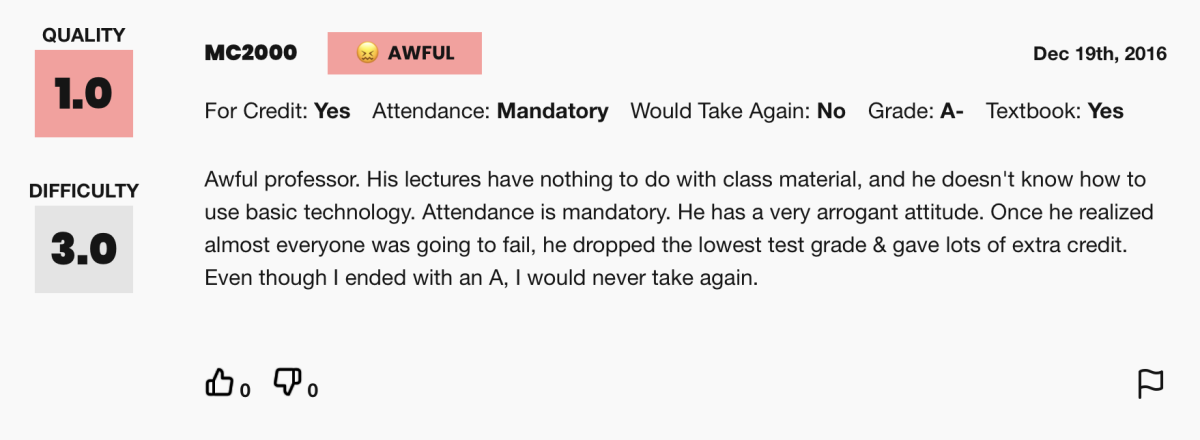Is Rate My Professors a reliable source? Having first-person accounts from students who’ve taken classes with a specific professor appears to be a great idea. However, there’s no fact-checking of the comments.
How are students supposed to know if the rating is accurate? After talking with a few students and professors from LSU, here’s what they thought about this source.
John Bishop, an LSU School of Music guitar instructor and music theory professor, has a rating of 3.4 out of 5 with five reviews. When asked what he thought of ratemyprofessors.com, he said, “Fundamentally, it is a money-making deal.”
Bishop’s comment is backed by some truth. The website is flooded with sponsored content. Without even scrolling to the bottom of the page, there’s an ad floating around on the webpage.
However, the ads aren’t what’s drawing people in. It’s the negative reviews. When looking for a class, students don’t look for positive reviews – they look for what to be wary of in a class.
“Obviously, one person’s opinion can’t tell you everything about a professor,” LSU senior Julia Oubre said. “Somebody could just have had a bad experience. But I’d definitely go kind of deep.”
One person doesn’t speak on behalf of the entire student body, Oubre said. However, when it’s not just one person saying negative things about a professor, it’s worth considering when choosing what classes to take.
“In college, discipline is gone, and it is performance. Either you do it or you don’t,” Bishop said. “And in that environment, especially with freshmen, they feel a loss of control, and they feel that their life is out of control.”
Coming out of high school, many freshmen use their newfound freedom to skip class, according to Bishop. If it’s not required, and sometimes even if it is, students may feel as though they don’t need to attend the class to understand the information.
In high school, by a student’s senior year, most of the information is repetitive or feels easy. This mindset can bleed into college, according to Bishop. Students must relearn how to study and absorb new information, or they will fail the class.
As a result, many students’ grades reflect their lack of effort. They want to be able to take the blame off of themselves. So, they go to ratemyprofessors.com.
Len Apcar, Professional-in-Residence for the Manship School of Communication, has a rating of 2.5 out of 5 based on 39 reviews.
“I don’t really like [ratemyprofessors.com] because it’s anonymous, and there’s stuff in there that’s just not true,” Apcar said.
A false comment that he received read, “Once he realized almost everyone was going to fail, he dropped the lowest test grade & gave lots of extra credit.”
“It was always in the syllabus,” Apcar said in response to this comment. “I always say I’ll delete the lowest grade.”
This anonymous commenter received an “A” overall after the grade drop and bonus points but was still agitated about the difficulty of the course. The commenter also didn’t include what they did to earn an “A” for the course.
Negative comments with scores of 1 out of 5 can destroy a teacher’s score and lead to fewer people signing up for the course.
Overall, from the faculty’s point of view, this website causes nothing but problems, and it propagates information that comes from online bullies. From the student’s perspective, ratemyprofessors.com is a useful resource when picking classes.
“If a professor doesn’t have many reviews or most of them are pretty neutral,” LSU freshman Amanda Meaux said, “I’m not going to be inclined [to take that class].”






